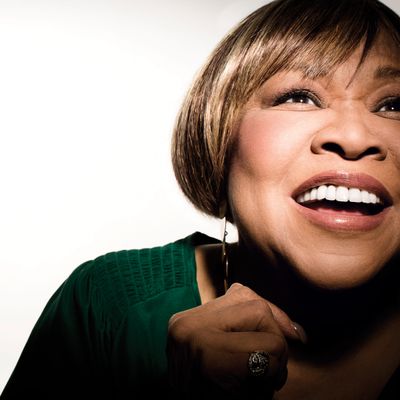
The first words you hear on Mavis Staples’s new album, One True Vine, take quiet wing with gospel self-assurance: “Some hoooly ghost … keeps me hangin’ on … I feel the hands I don’t see a-ny-onnnne.” Which makes her sound very, very churchly, but in person she cackles with nonstop delight. We’re sitting backstage at The Daily Show with her two-years-older sister and backup singer, Yvonne, whom she calls “Bunny.” She’s telling stories about how she got here from Chicago, where she was born in 1939. Her father, a bricklayer from Mississippi named Roebuck “Pops” Staples, took four of his five kids on the road as the gospel Staple Singers before they became “message” singers during the civil-rights movement and R&B pop stars after that. Drinking Honey Loquat and tea across from Yvonne, with her arthritic knee on ice, Mavis is on her fourth or perhaps fifth career, sent aloft this time by the discerning hunger for authenticity of the current indie-sincerity culture. Which is why she’s performed on The Colbert Report twice, and at Celebrate Brooklyn last week, and why Wilco’s Jeff Tweedy, a fellow Chicagoan, produced her two most recent albums and wrote some of the songs, too.
Tweedy got to know her when he heard her play some of her “message” songs during Obama’s 2008 run. After all, the 1972 Staple Singers hit “I’ll Take You There” was an Obama-campaign song. Not that she knew the Obamas: She and Yvonne just met them in April, when they were invited to play as part of Michelle Obama’s “In Performance at the White House” series. Back in Chicago, her family and the Obamas were members of Trinity United Church of Christ (where the Reverend Jeremiah Wright preached), but “it seemed like every time we went to church, they were out of town,” she says, nodding across to Yvonne, who’s dressed all in black and wearing what looks like a large percentage of her jewelry box, including several things Mavis gave her (“But I never meant for you to wear them all at once”).
Mavis almost didn’t show up to the White House: Her knee had taken a turn for the worse, and she was walking with a cane. “When I got to Washington, I couldn’t put any weight on it at all. It scared me to death. I said I wanted to go home. They said, ‘But Mavis, the president wants to see you!’ ” So she went. “You know who stood him up?” She sings: “ ‘Iiiii, I’m so in love with you!’ Al Green.” Apparently he wasn’t feeling well. “It’s really something big for him to miss that, the way Obama was singing his song, you know. I called Obama Sam Cooke when I first met him. ‘Oh, man,’ I said, ‘Sam Cooke is back.’ He walks like Sam, he looks like him, he smiles—oh, yeah. You see, all of us went to grammar school together. Sam and Lou Rawls and Jerry Butler. These were the doo-wop days. Then they formed gospel groups. Every Sunday, the preacher would let them use his church at 3 o’clock. And they would call it a battle. And nobody would be in this church but us children. We’d be eating French fries, and they’d be singing.”
That was in Chicago: As a child, Mavis and her sisters lived with their grandmother in Mississippi, who made her living picking cotton: “They weighed the cotton, and she’d get paid from what she picked.” Mavis used to get in fights because people would say, “ ‘You sound like a boy.’ Because my voice was so heavy.” She leans back. “Yeah, we got stories from Mississippi.” Once, the local physician had to be smuggled out of the state in a wooden box, like a coffin, “because the whites were going after him. He would talk up. They were going to lynch him.”
It’s also where the music came from. “The best music of my life I heard at my grandmother’s church, this little wooden church up on a hill,” she says. “Wooden floor, wooden benches, no organ. You would hear stompin’. ” She claps her hands and sings: “What are they do-ing in heaven today?”
Mavis was married for nine years (to an undertaker) in the sixties but never had kids. (She has said Bob Dylan once asked her father for her hand.)
It was almost time for the sisters to go on. I asked about one of two numbers they were going to sing, “I Like the Things About Me,” which her father had written. “We come up in a time when some blacks were ashamed of their hair and lips. We were proud we were wearing our nappy ’dos and our dashikis.” She cackles. “We’d go to the stockyards and get hogs’ heads for free and pick the teeth out and make necklaces out of it.”
“That was art,” says Yvonne. “You’d paint it and design it.”
“Everybody would want to know where we got our jewelry,” says Mavis. “We sang that song at Watts. After they burned everything down, after Dr. King was killed.” She begins to sing, with Yvonne following, harmonizing. “I looked in the mirror, and what did I see? / A brand-new image of the same old me! … I like the things about me that I once despised. Yeah! Mmm hmm.”
“Believe it!” says Yvonne, quietly.
“No more, no more! I’m so proud!” sings Mavis, improvising: “I’m proud of my nappy hair and my—big lips. Mmmmmnnnuuhn. And then, the congregation goes: Mmmmyeah! It’s funny.”
“It ain’t funny,” says Yvonne.
“It’s funny,” says Mavis, her laugh, as always, hanging on.
*This article originally appeared in the June 24, 2013 issue of New York Magazine.


